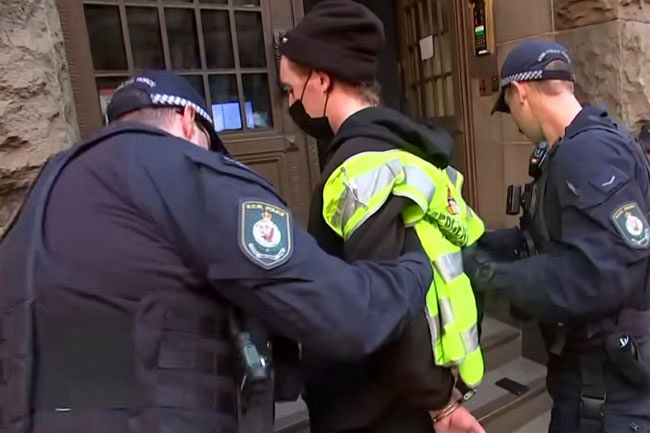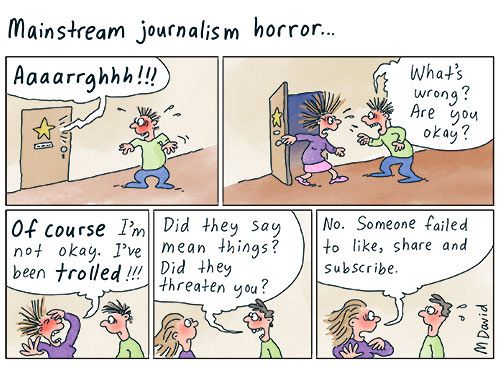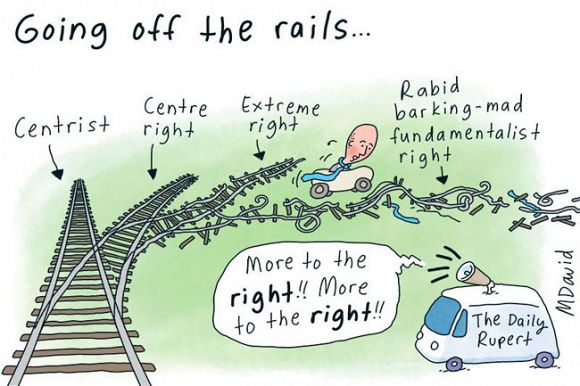Australia's democracy has been eroded by legislation that removes our rights and a dominant right-wing media, writes Sue Arnold.
HOW FRAIL is freedom, justice and democracy?
Look no further than the unfolding nightmare in the USA as the Supreme Court trumps government, establishing a different future for the nation. A nation that’s proudly declared itself the global bastion of democracy is now under siege by the Court, Trump, his devotees and Republican politicians in state and local government positions.
All supported by the right-wing propaganda arm, Fox News.
Thanks to Trump’s appointment of three judges to the Supreme Court, the six-Republican majority is attempting to change America’s culture and way of life.
Many of President Joe Biden’s attempts to bring America into the 21st Century, restoring the White House and its administration as democracy’s guiding light, have failed. Globally, the rise of autocrats is impossible to ignore.
Perhaps it’s time to ask how strong is Australia’s democracy? What about other Western democracies — how vulnerable are they to the forces of darkness?
There’s no doubt that Australia’s democracy has been considerably weakened, with major legislative changes and policies by Morrison and former L-NP governments. Their far-right credentials are solid.
Australia has no bill of rights. State governments are legislating tough anti-protest laws which can only be described as draconian. In April, the NSW Government introduced legislation that allows members of the public protesting illegally to be fined up to $22,000 and/or gaoled for a maximum of two years. The legislation was supported by the Labor Party.
A 2019 CIVICUS Monitor, a global research collaboration tracking fundamental freedoms in 196 countries, downgraded Australia from an “open” country to one where civil space has “narrowed”, citing new laws to expand government surveillance, prosecution of whistleblowers and raids on media organisations.
Is the loss of a democracy a carefully constructed long game of many small changes, finally adding up to control in the hands of corrupted governments? Although Australia is unlikely to follow the U.S. example, there are other more subtle ways to strip citizens of their rights leading to almost total control of the political dynamics.
The lack of any federal ICAC ensures politicians can’t be held to account. Former PM Scott Morrison and former Attorney-General Michaelia Cash worked tirelessly to make sure a toothless ICAC was the only option, ensuring insufficient support.
Given the extraordinary level of criticism by the PM, Liberal and National Party ministers hurled at the NSW ICAC when former NSW Premier Gladys Berejiklian was hauled up for questioning over her potential conflicts of interest, the failure to set up a federal independent agency to deal with corruption is very undemocratic.
It also set a precedent that government ministers are above the law. Sound familiar?
One of the most effective ways to dumb down a population in terms of its democratic rights is to create a national propaganda arm, ensuring mainstream media has effectively been taken over by vested interests. Giving Rupert Murdoch control of 59% of mainstream media worked well. Cancelling regional newspapers and local television stations was another step in the freezing of information.
Policies that would-be politicians take to the elections are meaningless. Big issues such as population growth, climate change and biodiversity loss are given a token mention. Yet these issues are the drivers of any future. Economic, environmental and physical. All involve democratic choices.
In March, the Australian Bureau of Statistics projected Australia’s population to grow to over 50 million people by 2101.
In research undertaken by Dr Julian Bolleter and Professor Robert Freestone, the experts argued that such a huge increase
‘...will have enormous implications for the country’s long-term infrastructure planning and prized livability, particularly in the capital cities where most growth is occurring.’
Do Australians want a Big Australia? Has any politician noticed that we can barely deal with the level of population growth now?
Where’s the research demonstrating Australia’s ecological carrying capacity given the exponentially increasing impacts of climate change? Can this ancient land provide 50 million people with food, water and shelter?
Are there enough agricultural lands? How many hospitals, schools and infrastructure prerequisites are needed?
What nationalities will make up the increased growth? Will they be compatible with the existing multi-cultural mix?
Are there any projections of potential social chaos?
A recent concern revolves around the L-NP stacked Administrative Appeals Tribunal, a legal entity charged with the power to consider the merits of government decisions in critical areas including the environment, freedom of information, immigration and NDIS.
Stacking the AAT with people who have Liberal connections has the potential to be a real problem, particularly in terms of environmental approvals. Although the legal options are restrictive, there is a path to higher courts through AAT decisions.
Former New South Wales Minister Pru Goward was appointed along with six people with Liberal links by Michaelia Cash, just prior to the Election. Labor has claimed that 85 members appointed to the AAT since the 2013 Election have Liberal or National links.
An analysis of the party connections in 19 new appointments makes sickening reading. Clearly, it was Morrison’s intention if he won the Election to ensure decisions by the stacked AAT would be in tune with his Government.
And, if the Election was lost, a new government would be hamstrung by the AAT’s L-NP bias.
It is impossible to overestimate the importance of an AAT staffed by objective, politically independent people. In many cases, challenging the merits of a decision can reverse major decisions. Former Senator Rex Patrick’s historic FOI appeal to the AAT to have cabinet papers released provided an important step in government transparency.
Patrick is fond of quoting American political activist Ralph Nader:
‘A well-informed citizenry is the lifeblood of democracy; and in all arenas of government, information – particularly timely information – is the currency of power.’
With News Corp's domination of the media, the ABC transmogrified into a pale ghost of itself.
How will citizens be well informed?
What values have forests, biodiversity, rivers and clean air? Democracy has worked tirelessly to defend and protect the rights of nature. As environmental protection laws are revoked, changed and re-worded to allow ongoing losses with no legal challenges, are these actions classified as a catastrophic loss of democracy?
Australia’s biodiversity is unique with 46% of birds and 69% of mammals unique to this country. Our nation was responsible for 60% of the world’s biodiversity loss between 1996 and 2008, according to a study published in the journal Nature.
Researchers examined the conservation status of species in 109 countries and compared that to conservation funding. Australia ranks as the second-worst in the group, with a biodiversity loss of 5-10%.
There are many more examples of an ongoing loss of democratic rights in this country. Considered together, a worrying picture emerges.
Now is the time to look very carefully at what needs to be done to ensure Australia’s political systems have stronger guard rails preventing governments from further eroding our rights.
Albanese’s Government could start by ending the News Corp monopoly of the media.
Sue Arnold is an IA columnist and freelance investigative journalist. You can follow Sue on Twitter @koalacrisis.
Related Articles
- PRESS CONFERENCE: Dave Donovan's Q&A with the Sydney Uni newsroom
- BOOK REVIEW: How to improve Australia’s Democracy – Breaking the Vicious Cycle!
- Right-wing governments are a threat to both U.S. and Australian democracy
- Technology and the internet threaten to undermine democracy
- Ten steps to save the democracy
 This work is licensed under a Creative Commons Attribution-NonCommercial-NoDerivs 3.0 Australia License
This work is licensed under a Creative Commons Attribution-NonCommercial-NoDerivs 3.0 Australia License
Support independent journalism Subscribe to IA.















